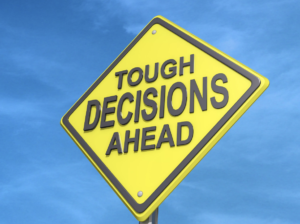 I attended a seminar by Dr. Paul Schempp, where he explored the science behind making good decisions. I was reviewing my notes from this today, as I always like going back after having let the material digest a while, to extrapolate the main points. His work is based on a 20 year study… here you go.
I attended a seminar by Dr. Paul Schempp, where he explored the science behind making good decisions. I was reviewing my notes from this today, as I always like going back after having let the material digest a while, to extrapolate the main points. His work is based on a 20 year study… here you go.
“People who make good decisions avoid making bad ones.” Seems logical right? I mean if you don’t make bad decisions, then either you aren’t making them or you are making good ones. But how do you avoid making bad ones? I broke this down into two groups, one I call foundational and the other is emotional.
Then foundational areas that trip people up are:
1) Biases – Using things you know, that you favor in persuading you in a direction that if the bias was there, you would not otherwise go
2) Inexperience – This is a hard one! We all want to think we know a lot, but making a decision that you haven’t had to make before is difficult
3) Limited Info – Not having enough facts to make a good decision can lead to making a bad one
4) Over Confidence – Many of us feel like we know what’s best or that we are bold decision makers… which can also lead to bad decisions
Emotional areas that when experienced, you should avoid making decisions:
1) Anger – This is an easy one. Do any good decisions get made when you are truly angry?
2) Fear – Another easy one, but sometimes hard to detect until after the decision was made… the ol’ hindsight thing
3) Sadness – A hard one to recognize. Making decisions when your mental state is out of balance is never good… see a trend?
4) Disgust – This was a fun one for me to think about. Have I ever made a decision when I have been disgusted?
5) Guilt – Another hindsight emotion. In the moment, this maybe hard to detect… be vigilant.
Dr. Schempp’s overall premise is that we make logical, rational decisions when we are calm. He states, “When you are in a state of excitability, your brain does not allow “x” to flow to the frontal part of your brain. Sorry about the “x” thing, I literally could not write fast enough to keep up with him… it is some chemical though 🙂
Lastly, he concluded that “Fight or Flight” moments want you to make a fast decision… which seems logical. Who wants to ponder the many options when being chased by a lion? Recognizing the foundational and emotional areas where bad decisions are made and just eliminating making decisions when in those areas will definitely make you a better decision maker, without even making a decision.
Learn more about Dr. Schempp here – http://www.performancemattersinc.com/
Learn more about how I can help your organization make better marketing decisions here – https://www.think-b.com/c-liason/

